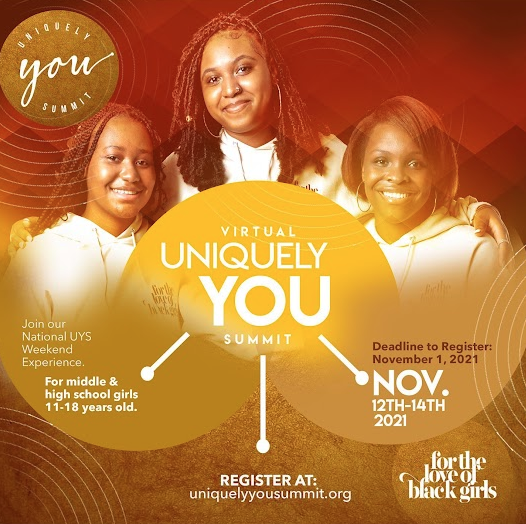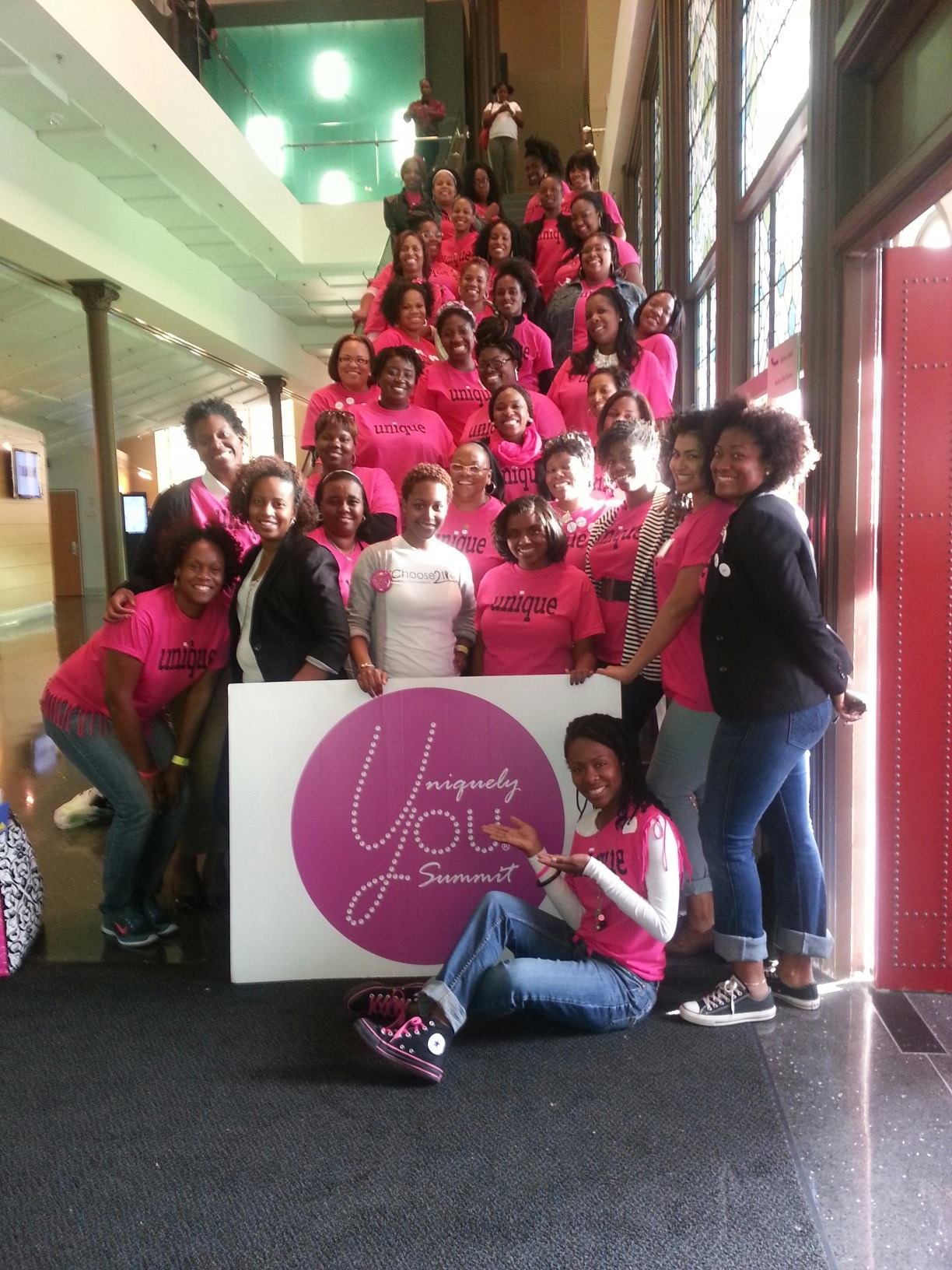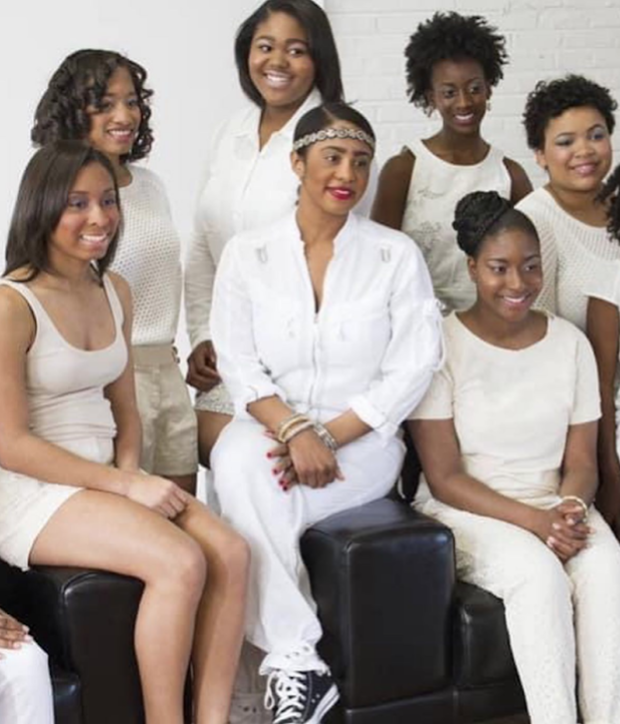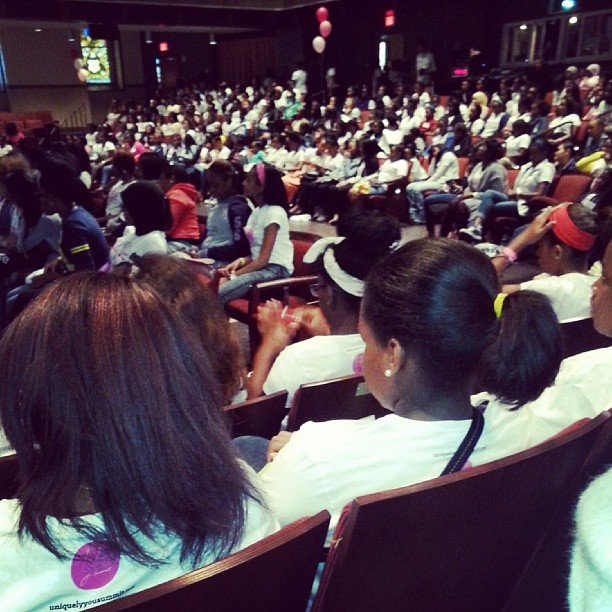UNIQUELY YOU SUMMIT: A Sisterhood Centering and Creating Space for Black Girls
The UNIQUELY YOU SUMMIT, INC. (UYS) has created a home and space for Black girls to exist, grow, and thrive, supported and nurtured by Black women who love them. During the COVID-19 pandemic, the Philadelphia-based non-profit shifted its programming and events to a virtual format – an unexpected pivot, but one that allows UYS to reach girls nationwide. Ahead of their 10th summit, take a look at the impact of their work – rooted in community and unapologetically pro-Black girl.
““The UNIQUELY YOU SUMMIT centers the Black Girl and gives voice and validity to the Black Girlhood experience.” ”
Before there was the affirmation that #BlackGirlsRock, or an acknowledgement of #BlackGirlMagic, Black girls existed – largely invisible or hyper-visible when there was a point to be made on our backs. But away from the glare of reality TV shows, the fascination with celebrities, and the allure of social media influencers, organizations like UYS have been holding space for every day Black girls. Why Black girls? Because Black girls need the right attention, deserve the real love, and benefit from the guidance of other Black women. For more than ten years, UYS has been showing Black girls in the mid-Atlantic region that they matter; now they are on a mission to reach many more.
In 2009, Shaleah Laché Sutton had a vision for what would eventually become the UNIQUELY YOU SUMMIT (UYS) - an event and an organization that center Black girls.
The idea for UYS was inspired by a talk show for young people that aired on Black Entertainment Television (BET) in the ‘90s, called Teen Summit. Shaleah, who was a member of the Teen Summit audience when she was 14, remembers feeling seen and heard and wanted to recreate that feeling for other Black girls. “I was going to create a safe space for black girls, in particular, to come and feel safe enough to have whatever conversations were on their mind,” she said. “And then I was going to bring in influential people, people that I looked up to, and that perhaps the girls would have similar interests with and also look up to come in and deliver powerful messages.” A year later, in the spring of 2010, UNIQUELY YOU SUMMIT launched with actress and activist Sheryl Lee Ralph as the keynote speaker.
Shaleah, a proud alumna of Spelman College in Atlanta, GA, partnered with the Philadelphia chapter of the National Alumni Association of Spelman College, to host the first summit at an all-girls school in Philadelphia. Each subsequent summit would be held on a college or university campus, an intentional decision to get girls familiar with spaces of higher education before attending college, something Shaleah herself never had. “I had never been on an airplane before I flew to Spelman College,” Shaleah said. “My first time stepping on the campus of Spelman College was my very first time on an airplane.”
Creating Space
“Coming from Philadelphia, I would see these school in our communities. Anybody that knows anything about a major university, or even an HBCU [knows] they are housed and centered in some of the most impoverished parts of major cities,” Shaleah said. “But these girls – similar to me – had never even stepped foot on campuses that were in their neighborhood. They weren't even really welcome, they knew that the school was there, but had never had been invited in, never had taken a step into the interior of that campus. So, I gave them an opportunity – right in their neighborhood – to be on those campuses.”
The UNIQUELY YOU SUMMIT brings together a group of middle and high-school aged girls, aged 11 – 18 years old, for a weekend experience where they take part in “a celebration, re-education, and healing for Black girls.” This year’s summit, rooted in the “JOYS OF BLACK GIRLHOOD,” is being held virtually November 12 – 14, 2021. Learn more and register here to attend. What is UYS like? Take a look at last year’s virtual summer here.
This year, 23-year-old UYS alumna Tiffany A. Coles is serving as Co-Chairwoman of the summit, alongside Shaleah, part of the intergenerational nature of the UYS work —Black women and Black girls holding space for one another and themselves.
“It's nothing like this work— to be surrounded by Black women; to be under the influence of Black people; and then to produce experiences for Black girls is priceless.”
~ Tiffany A Coles, UYS National Co-Chairwoman
“I really don’t remember my life before UYS,” said Tiffany, who has been actively involved in UYS since she was 11 years old, participating in each and every program. She recalls her very first experience attending a summit held at Villanova University. “I remember seeing so many Black girls in once space – I was blown away,” said Tiffany who at the time attended a school that was 99% white. Tiffany says she didn’t sleep that first night because she was so excited to go back the next day. “It was truly a life-changing experience.” And one that would put her on the path of what she believes is her life work, which is describes as both exciting and sometimes scary. Tiffany brings a unique perspective to UYS as a Black girl who has participated and benefitted from the programming to a young Black woman who is now crafting experiences for others. Hear what kept her involved:
Since its first summit in 2010, UNIQUELY YOU SUMMIT has gone from bringing hundreds of girls together for a weekend at a high school to now designing a summit for girls in 30 states, virtually, over the course of three days.
Over the years, UYS speakers and presenters have included women like: actress Pauletta Washington, actress Yara Shahidi, scholar-activist Dr. Yaba Blay, actress Teyonah Parris, activist Tamika Mallory, actress and comedian Amanda Seales, entrepreneur Deesha Dyer, actress Naturi Naughton, screenwriter Mara Brock Akil, and more.
Shaleah is both thoughtful and deliberate about the women she asks to be a part of UYS events. “I’m bold and intentional about my asks,” she says. Choosing women who the girls will be able to take something away from, not just people who are popular or have a lot of followers. “We like people that maybe not necessarily call themselves role models, but they believe that wholeheartedly that a part of their work purpose and mission is to impart wisdom and be someone that Black girls can look up to,” Shaleah said.
This work, which started out as a summit more than 10 years ago, has expanded to include new programs and events, including:
UYS Academy
Offers virtual “Love and Learning Labs” to give girls more regular interaction with UYS and an opportunity – especially in response to the pandemic— to connect, to engage, to experiment, and to be nourished. “When your teacher loves you and cares for you, you learn differently, you process differently, you interact differently, you grow differently, you excel differently. They're called “Love and Learning Labs” because what we know about these experiences is that you are taught something when you get loved up on too, and that love, encourages you to love up on somebody else,” said Shaleah Sutton.
FOR THE LOVE OF BLACK GIRLS Summer Camp
A two-week virtual experience for middle school girls rooted in the joys of Black Girlhood.
For Seniors Only!
A three-day mini summit designed as pipeline for girls who are going on to higher education. This program supports and empowers girls who have completed their high school journey and are now off to womanhood.
UYS Cover Girl Cohort
Instead of using stock images to promote its work, UYS engages participants to represent the organization as the faces and the voices of the work. Cover Girls also have the opportunity to travel, meet leaders creating change, and see themselves as able to make a difference. “It really is a pipeline that gives girls the opportunity to use their Black girl voice and know that it matters,” said Tiffany, who was a UYS Cover Girl in 2013.
What I Know Now
A fundraiser that grew out of requests from Black women to have some UYS programming for adult women. It is now a space where “Black women can get what they have asked us for,” while simultaneously funding the “For the Love of Black Girls Scholarship Program.
““Our biggest donors and contributors are Black women. And they give for the love of Black girls. They give for the little girl that was in them that needed something.” ”
FOR THE LOVE OF BLACK GIRLS
Started as an internal slogan UYS volunteers would say to help motivate each other through tough times – a reminder of why they did this work when they were faced with challenges or obstacles. “It is the reason officially why we do it,” Shaleah said. “It is at the epi-center and core of why we do what we do – everything is for the love of Black girls.” And it now encompasses so much more, including: the name of the Instagram page that provides inspiration, the name of forthcoming merchandise, the name of the UYS scholarship, and more. Last year, UYS awarded more than $45,000 in total to two girls headed to college. The ultimate goal: take care of all 4 years for a girl going to school of her choice.
“From the beginning, every woman who has been involved in this work does it from the kindness of her heart and really for the love of Black girls.” ”
UYS 2021 National Co-Chairwomen Shaleah Sutton, 41, and Tiffany Coles, 23, have a loving, layered relationship that exemplifies what UYS is and does at its core. During our interview they complimented one other, shared laughs, gave each other space to speak and filled in each other’s blanks. They did the interview — as they do the work— together. “[Tiffany] works with me as my equal in this work,” Shaleah says. “But then we have an auntie-niece relationship and a mentor-mentee relationship and we are friends. I find myself imparting a lot to her which took me years to learn because I don't want it to take her 20 years to learn something.” Here, they share some of their thoughts on success, inspiration, and Black girl bonds.
Sitting Down with Tiffany and Shaleah
Do you believe UYS is working and how do you measure success?
Shaleah: I certainly believe it’s working. One of the biggest success stories is Tiffany, starting this work at 11, coming through this program, and then being able to sit next to me over 10 years later as my co-chair – that's mind blowing. Another is Khanya Brann, who was at the very first summit, came through the program, was a cover girl, and had extraordinary opportunities within the program that a lot of girls haven't had. She is now working in the Biden administration, as a Senior Communications Assistant and Special Assistant to the Director of Communications. Those are two of the ways in which I measure success.
One of the things that I pride myself on that I consider successful is that I am providing opportunities that Black girls would not get elsewhere if they were not in this work. When our speakers or members of our network offer opportunities to our girls, it doesn’t matter who is ultimately selected, because I know she’s going to be a Black girl – not a Black boy, not a girl of color, not just a girl – a Black girl.
No matter what I do or how I do it, guess who’s benefitting? A Black girl– that’s success to me.
Tiffany: Success is also in the stories we hear, whether it’s a social media comment, a DM, or an email talking about girls who have gone through the work sharing how much confidence they gained or how much experience was given to them; how their eyes were opened from being around other Black girls and Black people who were truly invested in them. I think those are also ways to measure success in our work and to know that we are meeting the goals set forth by the organization. On our website there are commitments UYS has made to Black girls and every last girl, I can wholeheartedly say, the organization meets those.
What are the most pressing issues facing Black women and girls right now?
Shaleah: That’s an interesting question. If I had to just name one, I would say generational healing. We talk a lot about generational wealth as Black people, we talk a lot about legacy, but we are forgetting that we are the descendants of enslaved people. And as resilient as we are, we are people who have been impacted by structures and systems. I don't really know how to necessarily answer what are the most pressing issues because every issue impacts us, every structure impacts us, every system impacts us. Everything that happens in this country impacts us. So, everything that happens is pressing for Black girls. For each of us [the specifics] are different and for all of us it’s the same.
Tiffany: To give a term to what Shaleah was saying, Black girls aren't given space and time to actually be children. Adultification would just be the term I like to call that because that's what happens. We're the ones who are called to the principal's office, we are the ones who are called out for what we may be wearing whereas our peers can do the same thing and have no repercussions. There are so many studies and things that have been done to just talk about how this disregarded the black girl is.
“When black women or black girls are free, are no longer oppressive, that means nobody is oppressed.” ~ Combahee River Collective
What can we do as Black women to support Black girls and each other?
Tiffany: One of my mentors told me last year, “sharing stories saves lives.” Older generations were very tied to ‘what happens in this house, stays in this house,” but when we do that, we neglect to let girls in on the complexities of life. I feel that growing up and adulthood is very glamorized. No one talks about the authentic experience - what healing is, what growing is and how you change. If we talk more, that is where it would start - we would feel less isolated, we would feel more empowered to know that while things happen, it’s not the end; our resilience would be heightened, knowing how our moms and aunts went through something and made it. One of the biggest bonding factors we see with our program are shared experiences. Those things bring us together more than we know or recognize but you wouldn’t know about it unless you talk about it.
Shaleah: Take care of each other. Go out of your way for one another. Clap the loudest for one another. Give each other the royal treatment. And to do that, we have to not see each other as competition. We have to not think, well, if I give her that, then I won't have. No - if you give her that, then you will have more. It’s the same thing with giving or loving. When some one loves you on you, you’re ready to pay it forward. And if it comes from another Black girl, it is innate to us, it is who we are to give that to us again.
I wish there was like a day like, Give a Black girl a Compliment on Tuesday and see how fast that would spread. If we all did that on the same day, with every Black woman we saw, saying something kind or nice to her or sharing some love with her.
How did where you grew up affect who you became as an adult and the work that you do now?
Tiffany: Outside of my work with UYS, I also have my own nonprofit called Bosses Give Back, and a lot of that was rooted in my North Philadelphia experience. Growing up in North Philadelphia you see the disparities in the community and the inequality. You can live on the same street as millionaires, but three doors down there are children who don't eat dinner at night because of poverty. That played a big role in who I became as an adult, it activated me in many ways to want to enact change. As young people, we may not know how, but it gave me the fire and the passion that I needed because there were so many differences in my community that to me didn’t make sense. With my organization, we go into the community and figure out how we can give back. I feel that in order to be a boss, you have to give back. So what we take whatever resources and experiences we have, whether it's just our time and our love, and pour it into to the most underserved communities. And that's something I plan to continue to do.
Shaleah: I’m not a Philly girl, I am a Delco girl, through and through. Delco is the suburb right outside of the main city, so we'll put one foot in Delaware County and put one foot in Philadelphia, and they're vastly different experiences. My grandmother was one of 10 girls and when my grandfather married my grandmother he moved her to Delaware County, and they had the very first house on their block. I didn't grow up around poverty; I didn't see a lot of that, until I visited family. I was always, always very aware of whatever small privilege that I might have had. And even though I had similar experiences to Tiffany, as far as growing up in these white spaces, in white worlds, I always knew that I had a responsibility and at some point, I was going to be able to give what was given to me, and impart what was imparted to me and a lot of my work with UYS is informed by that. If we don't expose girls and they don't have opportunities, then they're not going to get it; somebody's got to do that.
Who inspires you?
Tiffany: I have two. One is my best friend, Darrien Johnson. We've literally been best friends since we were in second grade and now she is a master’s student at Columbia. She works with the Center for Black Educator Development. She's done a lot of work in politics and policy in Philadelphia. She's trademarked herself as the Community Curator and I feel like just watching us go from literally second graders living in North Philadelphia and walking to our neighborhood elementary school, to now seeing how she used her experiences to pour into the community is just so beautiful to me. I think another person would be my mentor LaToya Stroman. She's the founder of Girl Talk Global, in addition to the work that she does as a producer. I feel like Black women who are intentional about dedicating their time back into their community – it’s huge for me. So any Philly homegirls who do that are A-ok in my book.
Shaleah: Deesha Dyer. She didn't check a lot of the professional boxes when she became President Obama's social secretary. And even when she reached that [level] she was super authentic to who she was. And that's one of the first things she talks about wherever she is - ‘I'm a Philly girl. I grew up in North Philly, you know, all of my roots are Philadelphia.’ And I love that about her - her story really is, so Philly. There are a ton of us that make it to a level like that, and there are those that don’t. So for her to be as dedicated as she has been to reaching back and giving of herself in the way that she does, and then being authentic about it and telling her story so proudly, and being so true to who she is amazing. I mean, I think it's an inspiration to a lot of Black girls who don't check the boxes, even in their 30s. Right? I'm grateful for the way that she has persevered. It's been an inspiration.
“There wasn’t some valley or even mountaintop experience that caused me to do this work,” Shaleah said. “This work has always been a part of who I am.”
Shaleah comes from a tight-knit family where women outnumber the men easily. The mother of three children herself, twin boys and a girl, she grew up an only child spending a lot of time with her grandfather and his retired friends. As a child Shaleah recalls feeling different. She listened to Malcom X and Martin Luther King Jr. She pretended she was the host of The Oprah Winfrey Show, and was more interested in hearing Minister Louis Farrakhan speak than seeing Disney on Ice. She says she began to assimilate for survival.
“I think that girls are really lucky nowadays that there are so many other Black girls who want to do amazing things, or they're able to connect with,” she said. “There was a lot of assimilating that I did, just because I felt like I was supposed to - maybe I was the one who was not normal.” And she wonders what it would have meant for a girl like her to have UYS when she was growing up.
“We eliminate the perception of isolation for girls who may feel shame around some of the things that they go through in life. The summit connects those girls to let them know that they're not alone. UYS is girls being surrounded by other girls who want to take over the world.”
Shaleah became the women she once needed and has fully stepped into knowing her purpose.
Final Thoughts
“What I know, without a shadow of a doubt, is whether I’m here tomorrow, or next year — no matter how long or short life is — the work that we’ve done here, whether it is called UNIQUELY YOU, whether it’s called FOR THE LOVE OF BLACK GIRLS, it will carry on and someone will do something for another Black girl as a result of the work that we have been doing.”
“Black girls are dope and UYS is dope and everyone needs to know about it. And that’s the frame of mind I think we’re moving into in this new decade – how can we go bigger, how can we go international? Because there are Black girls everywhere who need this. – Tiffany Coles
Support and Stay in Touch
Follow UYS on social media - Instagram, Twitter and Facebook
Get involved virtually with the UYS parent community for parents and caregivers of Black girls to come and hear about black girls, talk about Black girls learn about how they can be advocates and supports of Black girls on their very unique journey.











